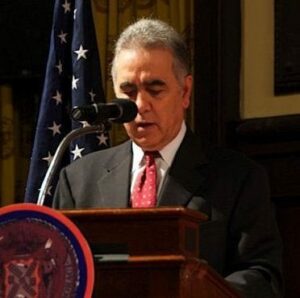For the first time, a prestigious nationwide survey, conducted on November 9 by Zogby Analytics, reveals the extent of the American public’s knowledge and opinion on the Armenian Genocide and Artsakh (Karabagh). The survey results, made available exclusively to this writer, have a +/- 3.1% margin of error.
To the question, are you aware that there was an Armenian Genocide, surprisingly only 34.8% of those surveyed answered ‘yes’; 49.6% ‘no’; and 15.6% ‘not sure.’ One would have expected that a much higher percentage of U.S. citizens would be aware of the Armenian Genocide, particularly after the large-scale Centennial commemorative events this year. The fact that half of all Americans have never heard of the Genocide of 1.5 million Armenians indicates that a major effort is needed to educate the public.
Zogby Analytics provides extensive information about the background of the participants in the survey. Here are some interesting details:
— While male respondents are evenly divided on the above question, there is a serious imbalance among women — twice as many females are unaware of the Armenian Genocide compared to those who are.
— Around half of all respondents are equally ignorant about the Armenian Genocide, regardless of political party affiliation. Liberals are slightly more knowledgeable than Moderates and Conservatives. Surprisingly, the majority of ‘Tea Party’ and ‘Occupy Wall Street’ sympathizers are cognizant of the Armenian Genocide.
— College graduates are more likely to know about the Armenian Genocide than those who are not.
— The age group 25-34 is the most knowledgeable about the Armenian Genocide, while the least knowledgeable is the age group 35-53.
— Hispanics are far more knowledgeable than ‘Whites’ about the Armenian Genocide; African-Americans and Asian-Americans are the least knowledgeable.
— Catholics are more aware of the Armenian Genocide than Protestants.
— West Coast Americans are more aware of the Armenian Genocide than their counterparts in the East; while those living in Central and Southern U.S. are the least knowledgeable.
— Americans with the highest income category ($100,000+) know the most about the Armenian Genocide; those making $35,000-$50,000 a year know the least.
In summary, the American most informed about the Armenian Genocide is: male, right or left wing political activist, college graduate, 25-34 years old, Hispanic, Catholic, lives on the West Coast, and makes over $100,000 a year; whereas the American least informed about the Armenian Genocide is: female, mainstream political party member, not a college graduate, 35-53 years old, African-American or Asian-American, Protestant, lives in the Central or Southern states, and makes $35,000 to $50,000 a year.
Here are eight other genocide and Artsakh-related questions that survey participants were asked to answer:
— 46.5% of Americans agree that the United States government should call on Turkey to publicly admit the Armenian Genocide; 16.1% disagree; and 37.4% don’t know.
— 39% agree that “the U.S. Congress should pass a resolution recognizing the Armenian Genocide… even if it risks destroying diplomatic relations with a key, strategic ally in the Middle East”; 22.5% disagree; and 38.5% don’t know.
— 63.2% agree that “if an ally of the United States initiates a program to eradicate, persecute or displace populations within their own country, the U.S. should end economic and/or military aid to that ally”; 10.5% disagree; and 26.3% don’t know.
— 20.1% believe that when a country commits genocide, it should pay reparations “in cash”; 11.8% say that it should compensate by returning the occupied “land”; 10.7%, “by other symbolic act”; 9.4%, “no reparations should be paid”; and 48% don’t know.
— 31.3% believe that the United Nations should determine what the reparations should be when genocide is committed; 23.8% say it should be decided by the International Criminal Court; 12.1%, the United States Congress; 3%, Amnesty International; 2.5%, the European Court of Human Rights; 0.8%, the Pope; and 26.5% don’t know.
— 37.9% believe that the United States should use “economic sanctions” against a country that “refuses to recognize and take responsibility for its crimes against humanity”; 16.4% say the U.S. should use “political/diplomatic pressure”; 8.6%, “embargo”; 2.6%, the U.S. should declare war; 4.5%, “do nothing”; and 30% don’t know.
— 38.3% agree that “the United States should intervene if Azerbaijan acts to expel the ethnic Christian Armenians [of Artsakh] who have resided there for centuries”; 21.8% disagree; and 39.9% don’t know.
— 40.4% agree that if Azerbaijan attacks Artsakh, the United States should call on Israel, which is selling sophisticated weapons to Baku, to cut off its diplomatic relations with Azerbaijan; 16.9% disagree; and 42.7% don’t know.
This first of its kind survey could serve as a valuable guide to the Armenian-American community to know where to concentrate its educational efforts and lobbying resources.



